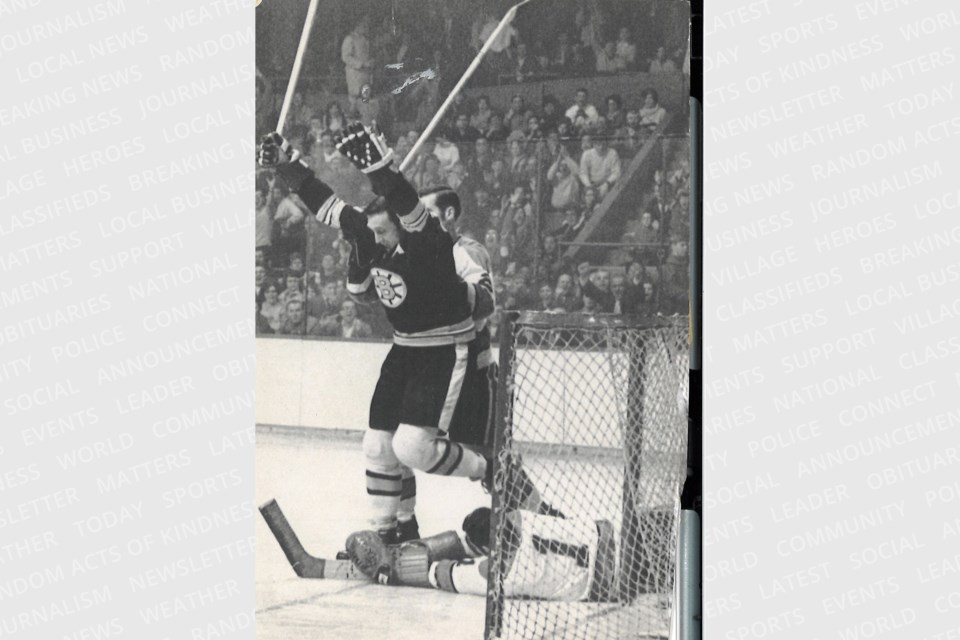From the archives of the Sault Ste. Marie Public Library:
Sault Ste. Marie has been home to many talented National Hockey League players over the last century. In recent weeks, the Sault’s own Michael Amadio scored a double-overtime playoff game-winning goal for the Vegas Golden Knights. However, few players from the city have left as golden a legacy as Phil Esposito.
When Esposito was just nine years old, his guidance counsellor asked him what he wanted to be when he grew up. “I want to be a hockey player” was his response. Not a lawyer, or a doctor, or a steel mill worker, but a hockey player. His guidance counsellor thought it was a terrible idea!
Little did she know Esposito would grow up to become one of the greatest hockey players of all time.
As a teenager, Esposito signed with the Chicago Black Hawks and was called up to the NHL in 1964.
In the following year, he was the team’s topline centre, playing alongside superstar Bobby Hull.
Esposito was relentless on the puck and an unmovable presence in front of the opposing net. His playmaking abilities were also second-to-none, as Hull ended the season by winning the Art Ross Trophy, awarded to the highest-scoring player in the league.
Back then, the NHL consisted of only six original teams. Esposito and the Black Hawks reached the Stanley Cup Finals before losing to the Montreal Canadiens in sudden-death game 7.
In 1967, Esposito was traded to the Boston Bruins in a blockbuster deal. He was reportedly less than thrilled and when management offered him a $10,000/year contract, Esposito threatened to quit hockey altogether and stay in Sault Ste. Marie.
Although he wanted nothing less than $12,000, Esposito finally accepted a $10,000 offer with additional scoring bonuses. By the end of the season, Esposito scored 35 goals and 84 points for the second-best total in the league. He was paid $16,500.
In the 1968-69 season, Esposito exploded under the Bruins.
In 52 years, no player had ever exceeded 100 points. Esposito obliterated the record, scoring 49 goals and tallying 77 assists to reach 126 points. It was his first of five Art Ross trophies, including the 1971-72 season where he broke the league record in goals, finding the back of the net 76 times and scoring a bewildering 152 points.
Both of those records stood for over a decade until former Soo Greyhound, Wayne Gretzky, asserted his historic dominance over the league in the 1980s. To this day, only four other players have reached 150 points in a single season.
However, an NHL player’s legacy is cemented not only by goals or points but from winning the coveted Stanley Cup. Esposito accomplished every hockey player’s dream in 1970, winning the Stanley Cup with the Bruins in a four-game sweep of the St. Louis Blues. Esposito’s 13 goals and 14 assists in the playoffs were, unsurprisingly, a new points record.
The Bruins repeated as champions in 1972 with Esposito leading the charge.
Esposito was so beloved by his fans, that bumper stickers were printed with the words “Jesus saves, but Esposito scores on the rebound.”
In the legendary 1972 Summit Series between Canada and the Soviet Union, Esposito was named Captain. Canada was seen as the underdog, but Esposito once again led the scoring race and pulled Canada to victory over the Russians, winning four games to three.
He was later named an Officer of the Order of Canada for his heroics.
After being traded to the New York Rangers in the 1975-76 season, Esposito ended his career in the Big Apple. At 37 years old, he dragged the Rangers to the Stanley Cup Final in 1979 where, unfortunately, they were defeated in five games.
Esposito retired from playing in the NHL in 1981. At the time he was heralded as the second-best player in history behind only Gordie Howe in recorded goals and points. Today, Esposito remains the seventh-best goal-scorer of all time with a staggering 717 goals to his name. For points, he is seated tenth with 1590.
Esposito entered the Hockey Hall of Fame in 1984. In 1987, his jersey number #7 was retired in Boston and hung from the arena’s rafters.
Not bad for a ‘terrible idea.’
Each week, the Sault Ste. Marie Public Library and its Archives provides SooToday readers with a glimpse of the city’s past.
Find out more of what the Public Library has to offer at www.ssmpl.ca and look for more "Remember This?" columns here.
